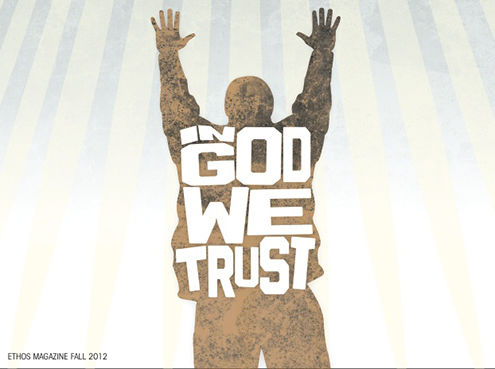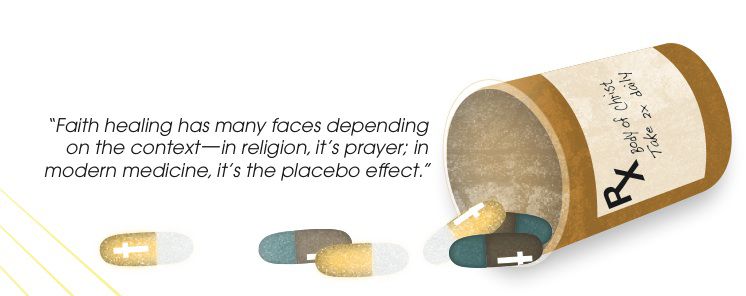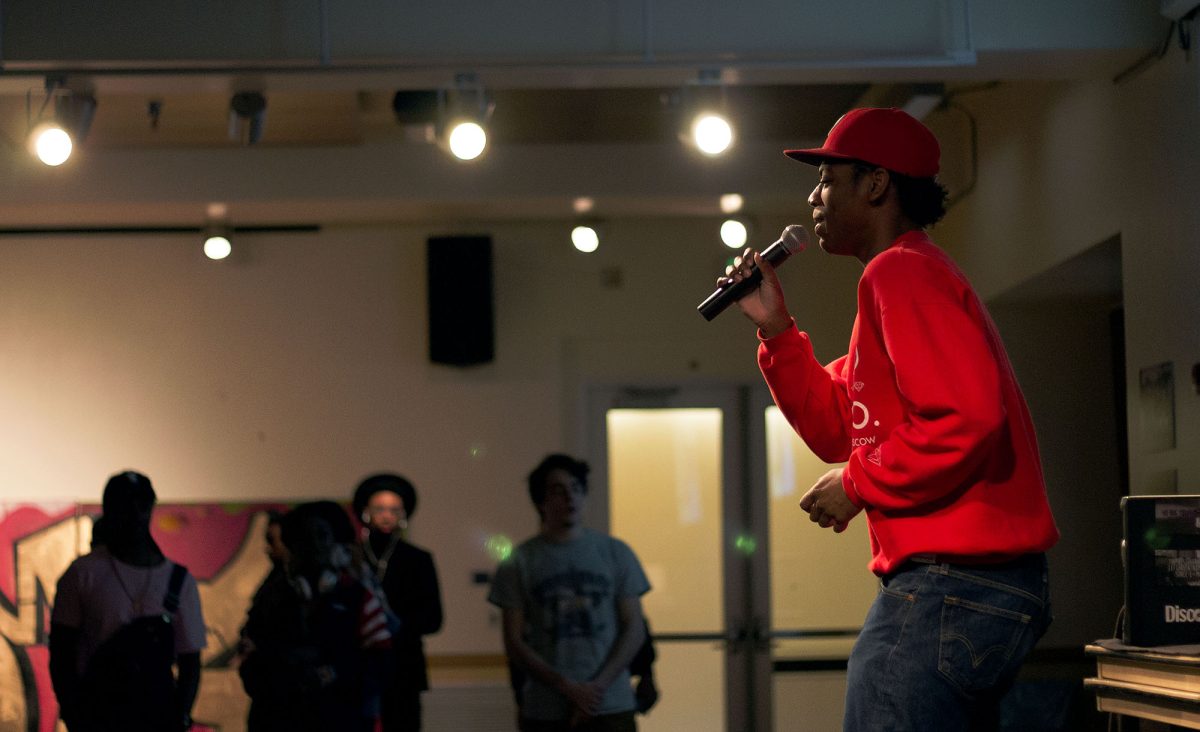Story by Ekaterina Vasileva
Illustration by Anna Helland
Quietly leaning over the body of his fatally ill son, the worried father daubs olive oil on his child’s forehead and says a prayer. He is unaware of the world outside; this fragile moment is between him and God. The father prays, and prays again. Moving around the room, he glances at his unconscious son. Each time his eyes land on the boy’s listless body, he asks God for another miracle. The father’s focus masks his anxiety, and the praying continues ceaselessly for hours. This is not a scene foreign to twenty-first century America, this is twenty-first century America, and this practice is known as faith healing.
Faith healing is the use of prayer to cure an ailment rather than the application of modern medicine. The practice is based on the belief that only God has the power to decide on matters of life and death; therefore, seeking medical treatment is believed to be going against God’s will.
Given the surge of religious identification in the US in recent years (an approximate 23.5 percent jump from 1990 to 2008, according to an American Religious Identification Survey), prayer has become the most common complement to medical treatment, overshadowing other types of alternative medicine including acupuncture and vitamins. However, in communities such as the Followers of Christ church in Oregon City, Oregon, prayer is applied as a substitute, rather than an accompaniment to medical care and this has led to disastrous consequences.
In recent years, the Followers of Christ church has attracted national attention for its faith healing practices, as well as its shunning of church members who seek professional medical treatment. The court trials, which often involved couples with young children, have drawn mass publicity.
On September 29, 2011, Followers of Christ church members Dale and Shannon Hickman were charged with second-degree manslaughter of their infant son, David, in a Clackamas County Court. The Hickmans had planned a home birth, which conformed to their religious beliefs; however, when their son was born two months early, weighing three pounds seven ounces, things did not go as planned. Severely premature, David quickly developed complications. Certain the strength of his faith in God would heal his son, Dale prayed and daubed David with olive oil. Despite the supplications, David died shortly after birth, living less than nine hours.
The Hickmans are not an isolated case. Another Oregon City couple, Timothy and Rebecca Wyland, was charged with first-degree criminal mistreatment after refusing to provide medical care for their infant daughter, Alayna, when she contracted an eye growth. Although it nearly blinded her, the Wylands instead chose to try healing the growth by prayer. In this case, the Wylands were lucky; when Alayna was taken into protective custody, she was treated by doctors who were able to cure her affliction. Under typical charges of criminal mistreatment the Wylands could have faced up to five years in prison. But under the protection of Oregon’s religious exemption clause, they were only given a 90-day jail sentence.
Given the severity of the children’s ailments and the availability of medical care, the following question lingers: How could the parents decide to not seek the help of a physician? In an interview with Oregon’s KATU News, former Followers of Christ member, Myra Cunningham, said disobeying the church is not so simple; renouncing medical care and relying on faith healing is rooted in deep religious convictions. Church members are told that doctors will not save their lives, and any members caught seeking a physician’s care will be shunned from the community. Cunningham also revealed that church members are forbidden to speak any individuals outside the congregation who are known as “worldlies.” Followers of Christ members are also as notorious for their privacy as they are for their court cases; members avoid speaking with reporters about their healing practices in any detail and as a result, almost all information on their habits has been gathered from court trials.
In the meantime, the Followers of Christ rigid faith healing practices have affected Oregon’s stance on laws regarding religious exemption. Days after the Wylands’ conviction in 2011, Oregon governor John Kitzhaber signed Measure 11, a law eliminating religious exemption (and thus legal protection) for parents who employ faith healing, rather than modern medicine, to cure their sick children. Any cases following the Hickmans and the Wylands will be punished with mandatory sentencing under the new law. Based on the ruling regarding Oregon’s religious exemption laws, does faith healing have a place in modern society?
A 2007 Baylor University national study of religion revealed that only 15.9 percent of respondents stated they have experienced “miraculous, physical healing.” In contrast, Center for Disease Control’s statistics report that 82.2 percent of American adults, and 92.1 percent of children, have had contact with a health care professional in the last year. Comparing these two reports, it appears that Americans are reliant on modern medicine, not faith healing, for their health. Or are they?
On the flip side of the faith healing coin, Nigel Barber, an evolutionary psychologist who writes for Psychology Today, says faith healing is prevalent in modern medicine and can improve immune function. A report from the American Cancer Society implies there is a lot to be said for mind over matter: a small percentage of cancer patients find their disease in complete remission with no explanation other than a strong belief in the cure, which may have dramatically increased their chances of surviving the disease. This optimism can go a long way; many physicians assert that a patient’s belief in a treatment is equally as vital as the treatment itself.
Faith healing is complex and context laden subject: in religion, it’s prayer; in modern medicine, it’s the placebo effect. It also has a history—the power of healing has been attributed to God and spiritual figures for thousands of years, and the tradition remains unbroken in modern religious communities. Faith healing continues to be practiced among Christian Scientists, some orthodox Jewish sects, evangelical Protestants, and other groups. In cases of terminal illness, faith healing begins where modern medicine ends, giving patients and their families comfort, and sometimes, the hope of a cure. But despite the limitations of modern medicine, the necessity of faith healing in a modern society remains to be known.
Categories:
The Religion Prescription
September 24, 2012

Kyle McKee
Kyle McKee
0
Donate to Ethos
Your donation will support the student journalists of University of Oregon - Ethos. Your contribution will allow us to purchase equipment and cover our annual website hosting costs.
More to Discover














